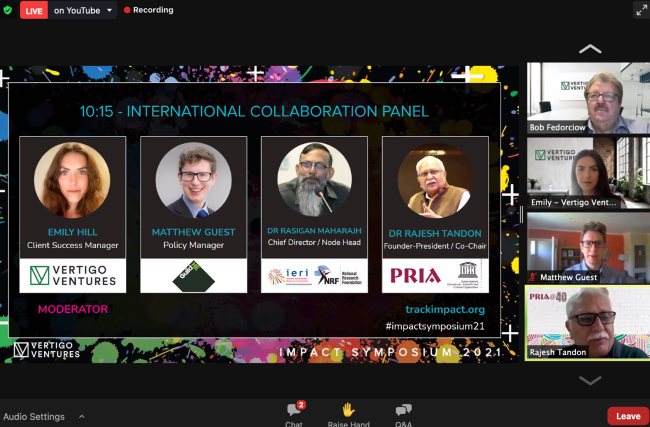Date/Time
Date(s) - 29/09/2021
2:45 pm
Categories No Categories

Dr. Rajesh Tandon spoke at the Impact Symposium hosted on September 29, 2021 at 2:45 pm IST.
He started with the basic principle of participatory research, that assumes that the community has experiential knowledge which is valuable and which it uses to survive and innovate. Therefore external support that comes to improve the conditions in a particular community should start by acknowledging their knowledge system. Scientific research is no longer restricted to researchers and scientific institutions after Covid- 19, but in fact is more and more under scrutiny of the public eye.
Secondly, if we want to focus on collaborations on SDGs, they has to be local because their achievement, let alone interpretation has to be local. The Knowledge for Change Global Consortium uses a collaborative approach for framing research questions and then undertaking research in partnership with local communities.
Investing in local leadership, local relations of trust in normal situations is greatly valued in abnormal situations. You can work collaboratively when previous relations of trust already exist. The words, concepts have different meanings and can only be understood if you have already built capacities with the community and have a mutual understanding with it. Moreover, those of us responsible for learning of young people and producing knowledge for change are becoming “virtually lazy” by taking advantage of virtual connectivity to avoid building face-to-face capacities.
Dr. Tandon stated that we need to vigorously find ways to connect with people across boundaries that divide us for common good, and the spirit of solidarity needs to enter collaborative research efforts. Mr. Rasigan Maharajh added here that we cannot continue with uneven capacity distribution around the world; we need to transform, not reform. Global solutions will work when all our local solutions work. He ended by emphasizing that being privileged to have access to scientific knowledge, bestows on us the responsibility to help disadvantaged groups break out of the information asymmetries and inequalities in accessing scientific knowledge and data.




